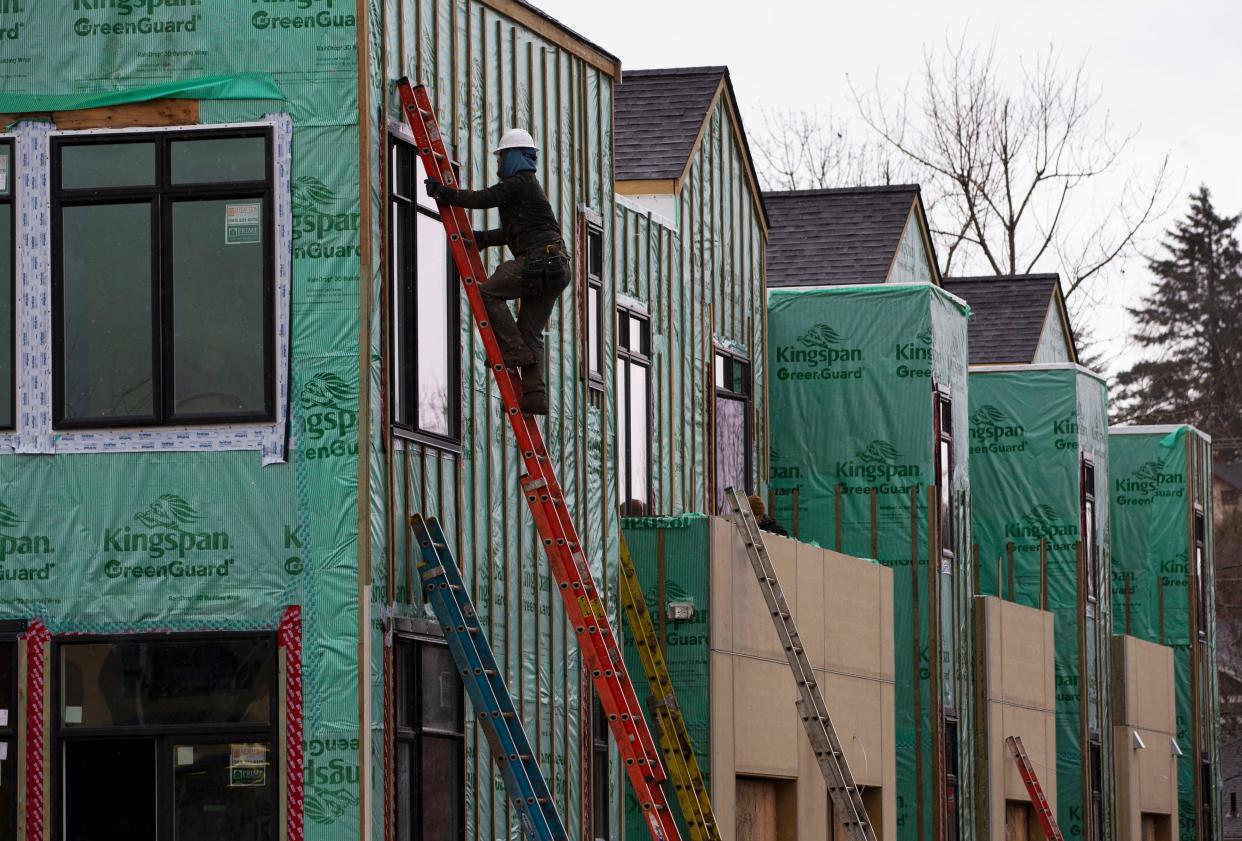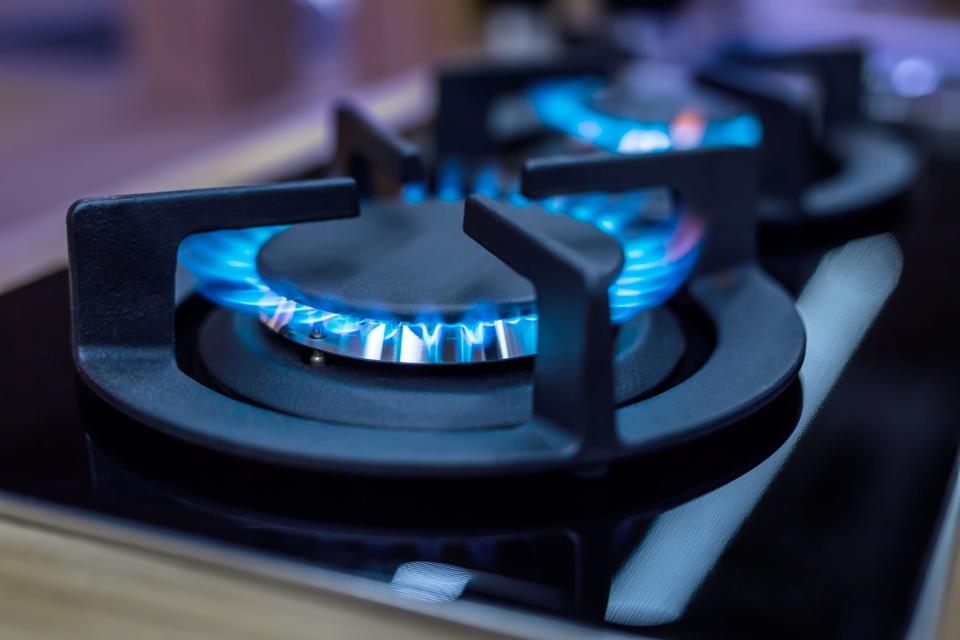Eugene bans natural gas, other fossil fuel infrastructure in some new residential buildings

Eugene has banned natural gas and other fossil fuel infrastructure in new homes, townhouses and other residential structures no taller than three stories.
City councilors voted 5-3 Monday night to pass an ordinance that will apply to building permit applications submitted on or after June 30, 2023. They've cited concerns about climate change and public health during several years of discussions about decarbonization and electrification.
The vote came after the council rejected a move to place the ordinance on the May ballot.

Councilor Emily Semple, who made the motion to approve the ordinance, said it was “time to pass this and not make any more to do about it and get on with the rest of the package and the other things we need to deal with.”
Other officials worried the move, which was not originally on the agenda for Monday night’s special meeting, will lead to problems.
“I really hope this doesn’t blow up in our faces, but I have a sneaking suspicion it will and set us backward instead of forward,” said Councilor Alan Zelenka, who made a failed motion to postpone the vote but ultimately supported the ordinance.
Councilor Mike Clark, who voted against the ordinance, said its passage will divide people more than they already are on the issue. Clark had pushed for putting the ban into a ballot measure after the proposed ordinance drew hours of testimony in a public hearing that went so long officials had to continue it to a second meeting.
Those in support framed their arguments around health and the community, and they praised the council’s move.
“Elected officials across Oregon should follow Eugene’s lead,” said Dylan Plummer, a representative with the Sierra Club who testified before the council several times. “Local leadership in standing up to polluters has never been more important.”
Nearly 100 cities across the country have passed similar ordinances. Eugene is the first in Oregon to do so.
People opposing the ordinance focused on energy choice, security and pragmatism. They also argued the council should let residents decide through a ballot measure.
The ban “eliminates energy choice for new homes,” NW Natural said in a statement. The gas utility added councilors “ignored the thousands of residents, workers and community leaders that registered their opposition” by not putting the issue out for a public vote.
Councilors said they anticipate a community petition to put the ban to a vote. The ordinance would be on hold during signature gathering and, if applicable, the wait between certification and election results, according to the city attorney.
What does the ordinance do?
The ordinance prohibits fossil fuel infrastructure in new low-rise residential buildings. It takes effect for building permits submitted on or after June 30, 2023.
It defines fossil fuel infrastructure as “natural gas piping, fuel oil piping, or other fossil fuel piping or conveyance system within a building, that connects a source of supply to a fossil-fuel burning appliance.”
Low-rise residential buildings are ones no taller than three stories with one or more permanent dwelling units, including:
Detached one- and two-family houses
Attached single family dwellings (townhouses)
Manufactured homes
Multi-family residential buildings
The ordinance would not include mixed-used buildings where there are both retail and residential uses.
It does not include existing low-rise residential buildings.
Putting to ballot measure failed
Clark and other councilors had requested discussion about putting the ban to a vote on the May ballot.
“I think this rises to the level of allowing the community to have impact on this,” Clark said.
He added there’s a “high degree of cynicism about council’s decision making” and he thinks putting a topic with so much interest to a vote could improve public opinion.
Clark worried the council voting through the ban would spark “a level of community cynicism that will be more toxic than what we have now.”
Councilors Greg Evans and Randy Groves also supported putting the ban on the May ballot, but others pushed for action.
“We’ve been working on this for a very long time, and the opposition is fairly recent,” Semple said.
It’s important for officials to honor decarbonization goals in the city’s climate recovery ordinance, she said, and they’re behind targets.
Mayor Lucy Vinis agreed the issue has progressed “very slowly” and pointed to an executive order from Gov. Tina Kotek as a reason for acting now.
“We have a governor who has pledged to build 36,000 new houses a year,” Vinis said. “We do not want those houses with natural gas hookups, and we can lead the way in the city of Eugene to say, ‘This is how it’s done.’”
‘We have to start moving’
Though Zelenka voted in favor of the ordinance, he said it was a mistake to move forward with a “piecemeal” ordinance.
There’s been “so much misinformation” about the ban, he said, and he fears “what we’re going to be doing here is actually just making it worse.”
Zelenka pushed for a package of ordinances paired with incentives.
Evans agreed councilors should put together a more comprehensive package instead of “isolating one piece of this.” He added officials have gotten onto a “sidetrack of electrification and banning natural gas.”
Vinis said the council has approved a package through five motions passed in July that directed staff to draft multiple ordinances and set up a business engagement plan.
The city pulled out the ordinance for new home construction because it was “simple and applied to buildings that don’t yet exist,” Vinis said. People opposed to the ordinance have blown it out of proportion, she said, likely because of the remaining ordinances related to commercial and industrial buildings and existing homes.
Councilor Jennifer Yeh remembered learning about global warming when she was younger and “waiting on the adults in my community to do something.” They pushed recycling, she said, but councilors have a chance to show they’ll make progress.
“It’s going to be slow, and it’s going to take us decades,” she said. “But we have to start moving.”
Community reaction varies
Advocates who have made an organized push for electrification and banning natural gas praised Eugene for passing the ordinance.
They’ve testified for more than a year that gas appliances contribute to climate change and to indoor and outdoor air pollution.
At least one recent study has shown air pollution from gas stoves led to around 12% of childhood asthma cases.
The vote increases “access to healthy all-electric homes,” said Jerrell Brown, environmental and climate justice organizer with the NAACP Eugene-Springfield.
“Communities of color in Eugene are more likely to breathe hazardous air in our neighborhoods – our homes should be places of refuge, not one more source of pollution for overburdened lungs,” Brown said in a statement.
NW Natural has refuted arguments about health hazards and questioned the climate benefit of the ban. The utility cited reports they say point to minimal emissions reductions, but the city argues NW Natural has misrepresented the numbers.
NW Natural is working with community partners to look at options for next steps in the wake of Monday’s vote.
One option is a petition to put the ordinance into a ballot measure.
There’s a 30-day deadline to file that petition, the city attorney told councilors. Once filed, the petition would pause the implementation of the ban. If petitioners collect enough signatures, that stay would continue until an eventual vote on the ballot measure.
Contact city government watchdog Megan Banta at mbanta@registerguard.com. Follow her on Twitter @MeganBanta_1.
This article originally appeared on Register-Guard: Eugene bans natural gas in new homes

